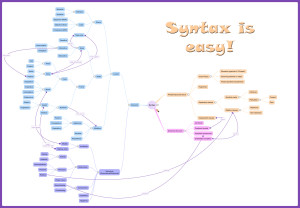
This posts covers an introduction to basic syntax. Skill level: Beginner.
Objectives:
- Identify the three levels of syntax.
- Classify words according to their appropriate levels.
For a definition of “syntax,” click here. (I could paraphrase, but I’d have to give credit anyway, so I might as well send you straight to the source.) Right, then. With that settled, let’s jump right in, shall we?
Syntax categorizes every word in a sentence according to three levels of meaning. This might seem like a tedious endeavor, but it’s actually quite fun. (Disclaimer: It’s fun if you’re a complete language nerd; otherwise, it’s probably pure agony, but I wouldn’t know for sure.) These three levels are lexical, grammatical, and rhetorical. I differentiate them as follows:
- Lexical: If discourse is a meal, the lexical words are the meat and potatoes (or main dish, for any vegans out there). These are words with concrete definitions, usually easy to describe, define, or replace. They have synonyms. They fall into one of the following categories: Noun, Verb, Adjective, Adverb, Preposition.
- E.g., banana: noun. a long, yellow fruit native to tropical regions
- Grammatical: The side-dishes and utensils of your syntactic feast; these are words with abstract definitions, usually more difficult to describe or explain. Replacing them often shifts the meaning of the sentence. Grammatical words include the following categories: Auxiliaries, Determiners (including Articles and Pronouns), Negatives, Quantifiers.
- E.g., the: determiner. the definite article, used in language to specify a particular object, as opposed to its indefinite counterpart, a/an. Takes a noun as its complement.
- Rhetorical: The sauces and condiments in our food analogy; rhetorical elements can overpower or subtly enhance, depending on how they are used. As implied by its name, this level helps place the sentence in the context of its surrounding discourse. Words are classified as Complementisers (with features of Force, Topic, Focus, and Finiteness) and can include Conjunctions, depending on context.
- E.g., because: complementiser. subordinating conjunction that tags a reason for something to occur.
The rhetorical level also includes words or phrases that have crossed over from lexical/grammatical categories. In becoming rhetorical, these words are often bleached of a concrete lexical meaning to assume their rhetorical one instead. Context is typically required for proper identification.
- E.g., hopefully: complementiser. lexical definition means “in a manner full of hope” but rhetorical use means “I hope that…” “We hope that…” or “It is generally hoped that…,” as in “Hopefully it will rain tomorrow.” (Rephrased as “I hope that it will rain tomorrow” vs. *”In a hopeful manner it will rain tomorrow.”)
Exercise A: Classify the following words as lexical, grammatical, or rhetorical; if words can fit into multiple categories, explain why.
think, care, pretty, upon, you, purple, indignation, am, that, do, play, which, breeze, shoe, only, frequent, clover, image, should, her, not, if, sparkling, consequently, sing, must, however
Exercise B: Identify all the lexical words in the following sentence:
“It was a dark night, though the full moon rose as I left the enclosed lands, and passed out upon the marshes.”
(Charles Dickens, Great Expectations, chapter 53)
See what I mean? Easy-peasy! But what, you may ask, does any of this have to do with actual writing?
Just kidding. No one’s really asking that. But I’ll answer anyway. The lexical words we use are the most important part of any narrative. The grammatical and rhetorical words can bog down that narrative or make it soar, depending on how the writer uses them. A writer who can differentiate between these three classifications is better equipped to strike a balance among them in her linguistic craftsmanship.
Or so I like to think. And it’s my blog, so that’s how it stands.